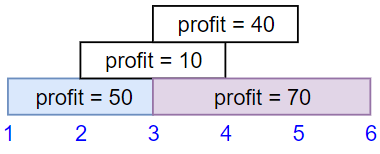We have n jobs, where every job is scheduled to be done from startTime[i] to endTime[i], obtaining a profit of profit[i].
You're given the startTime, endTime and profit arrays, return the maximum profit you can take such that there are no two jobs in the subset with overlapping time range.
If you choose a job that ends at time X you will be able to start another job that starts at time X.
Example 1:
Input: startTime = [1,2,3,3], endTime = [3,4,5,6], profit = [50,10,40,70] Output: 120 Explanation: The subset chosen is the first and fourth job. Time range [1-3]+[3-6] , we get profit of 120 = 50 + 70.
Example 2:
Input: startTime = [1,2,3,4,6], endTime = [3,5,10,6,9], profit = [20,20,100,70,60] Output: 150 Explanation: The subset chosen is the first, fourth and fifth job. Profit obtained 150 = 20 + 70 + 60.
Example 3:
Input: startTime = [1,1,1], endTime = [2,3,4], profit = [5,6,4] Output: 6
Constraints:
1 <= startTime.length == endTime.length == profit.length <= 5 * 1041 <= startTime[i] < endTime[i] <= 1091 <= profit[i] <= 104
class Solution:
def jobScheduling(self, startTime: List[int], endTime: List[int], profit: List[int]) -> int:
@cache
def dfs(i):
if i >= n:
return 0
_, e, p = jobs[i]
j = bisect_left(jobs, e, lo=i + 1, key=lambda x: x[0])
return max(dfs(i + 1), p + dfs(j))
jobs = sorted(zip(startTime, endTime, profit))
n = len(profit)
return dfs(0)class Solution:
def jobScheduling(self, startTime: List[int], endTime: List[int], profit: List[int]) -> int:
jobs = sorted(zip(endTime, startTime, profit))
n = len(profit)
dp = [0] * (n + 1)
for i, (_, s, p) in enumerate(jobs):
j = bisect_right(jobs, s, hi=i, key=lambda x: x[0])
dp[i + 1] = max(dp[i], dp[j] + p)
return dp[n]class Solution {
private int[][] jobs;
private int[] f;
private int n;
public int jobScheduling(int[] startTime, int[] endTime, int[] profit) {
n = profit.length;
jobs = new int[n][3];
for (int i = 0; i < n; ++i) {
jobs[i] = new int[] {startTime[i], endTime[i], profit[i]};
}
Arrays.sort(jobs, (a, b) -> a[0] - b[0]);
f = new int[n];
return dfs(0);
}
private int dfs(int i) {
if (i >= n) {
return 0;
}
if (f[i] != 0) {
return f[i];
}
int e = jobs[i][1], p = jobs[i][2];
int j = search(jobs, e, i + 1);
int ans = Math.max(dfs(i + 1), p + dfs(j));
f[i] = ans;
return ans;
}
private int search(int[][] jobs, int x, int i) {
int left = i, right = n;
while (left < right) {
int mid = (left + right) >> 1;
if (jobs[mid][0] >= x) {
right = mid;
} else {
left = mid + 1;
}
}
return left;
}
}class Solution {
public int jobScheduling(int[] startTime, int[] endTime, int[] profit) {
int n = profit.length;
int[][] jobs = new int[n][3];
for (int i = 0; i < n; ++i) {
jobs[i] = new int[] {startTime[i], endTime[i], profit[i]};
}
Arrays.sort(jobs, (a, b) -> a[1] - b[1]);
int[] dp = new int[n + 1];
for (int i = 0; i < n; ++i) {
int j = search(jobs, jobs[i][0], i);
dp[i + 1] = Math.max(dp[i], dp[j] + jobs[i][2]);
}
return dp[n];
}
private int search(int[][] jobs, int x, int n) {
int left = 0, right = n;
while (left < right) {
int mid = (left + right) >> 1;
if (jobs[mid][1] > x) {
right = mid;
} else {
left = mid + 1;
}
}
return left;
}
}class Solution {
public:
int jobScheduling(vector<int>& startTime, vector<int>& endTime, vector<int>& profit) {
int n = profit.size();
vector<tuple<int, int, int>> jobs(n);
for (int i = 0; i < n; ++i) jobs[i] = {startTime[i], endTime[i], profit[i]};
sort(jobs.begin(), jobs.end());
vector<int> f(n);
function<int(int)> dfs = [&](int i) -> int {
if (i >= n) return 0;
if (f[i]) return f[i];
auto [_, e, p] = jobs[i];
tuple<int, int, int> t{e, 0, 0};
int j = lower_bound(jobs.begin() + i + 1, jobs.end(), t, [&](auto& l, auto& r) -> bool { return get<0>(l) < get<0>(r); }) - jobs.begin();
int ans = max(dfs(i + 1), p + dfs(j));
f[i] = ans;
return ans;
};
return dfs(0);
}
};class Solution {
public:
int jobScheduling(vector<int>& startTime, vector<int>& endTime, vector<int>& profit) {
int n = profit.size();
vector<tuple<int, int, int>> jobs(n);
for (int i = 0; i < n; ++i) jobs[i] = {endTime[i], startTime[i], profit[i]};
sort(jobs.begin(), jobs.end());
vector<int> dp(n + 1);
for (int i = 0; i < n; ++i) {
auto [_, s, p] = jobs[i];
int j = upper_bound(jobs.begin(), jobs.begin() + i, s, [&](int x, auto& job) -> bool { return x < get<0>(job); }) - jobs.begin();
dp[i + 1] = max(dp[i], dp[j] + p);
}
return dp[n];
}
};func jobScheduling(startTime []int, endTime []int, profit []int) int {
n := len(profit)
type tuple struct{ s, e, p int }
jobs := make([]tuple, n)
for i, p := range profit {
jobs[i] = tuple{startTime[i], endTime[i], p}
}
sort.Slice(jobs, func(i, j int) bool { return jobs[i].s < jobs[j].s })
f := make([]int, n)
var dfs func(int) int
dfs = func(i int) int {
if i >= n {
return 0
}
if f[i] != 0 {
return f[i]
}
j := sort.Search(n, func(j int) bool { return jobs[j].s >= jobs[i].e })
ans := max(dfs(i+1), jobs[i].p+dfs(j))
f[i] = ans
return ans
}
return dfs(0)
}
func max(a, b int) int {
if a > b {
return a
}
return b
}func jobScheduling(startTime []int, endTime []int, profit []int) int {
n := len(profit)
type tuple struct{ s, e, p int }
jobs := make([]tuple, n)
for i, p := range profit {
jobs[i] = tuple{startTime[i], endTime[i], p}
}
sort.Slice(jobs, func(i, j int) bool { return jobs[i].e < jobs[j].e })
dp := make([]int, n+1)
for i, job := range jobs {
j := sort.Search(i, func(k int) bool { return jobs[k].e > job.s })
dp[i+1] = max(dp[i], dp[j]+job.p)
}
return dp[n]
}
func max(a, b int) int {
if a > b {
return a
}
return b
}


